Essential oils these days seem to be turning up into a wide variety of things, from cleaning products to medical products, they are there. Though they are quite popular, the scientific support for positive health effects is limited and contradictory.
Likewise, this is especially true when it comes to discussing the health effects of essential oils on your cat.
Is it safe to diffuse pure essential oils around your pets? Are essential oils safe for cats? — These types of questions are sure to pop up in the heads of many cat parents.
Well, let’s find out the answers to such questions!
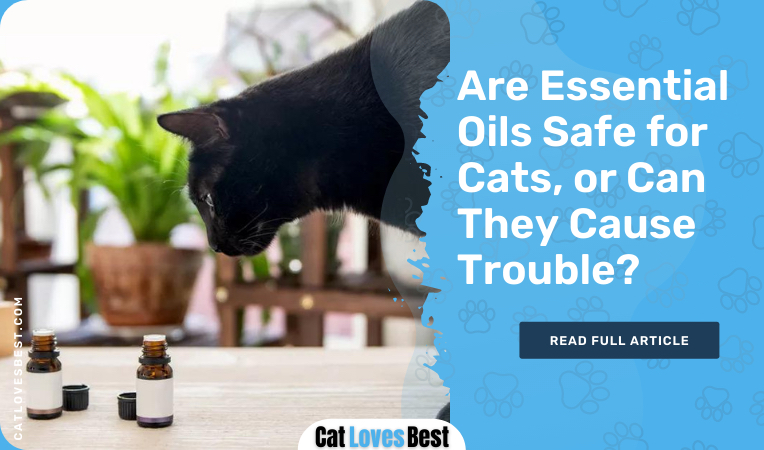
Are Essential Oils Toxic to Cats?
Essential oils can be highly toxic to household pets, including cats. In fact, the essential oils are quickly absorbed by cats, both orally and through the skin. Later, they get metabolized in the cat’s liver. However, cats lack a vital enzyme, making it difficult to eliminate certain toxins.
On the other hand, felines are sensitive to phenols and phenolic compounds, which are usually found in some essential oils. And higher the concentration of the essential oils, the bigger risk it poses to the cats.
But what exactly are essential oils? Let’s find out!
But What Are Essential Oils, and Where Do They Come From?
Essential oils are basically the concentrated plant extracts, which are used for their fragrant and healing properties for us humans, for instance, rosemary and tea tree oil. These oils are used by people, usually for therapeutic purposes, such as when applying them topically during a massage or in aromatherapy.

Apart from the topical benefits, inhaling the essential oils can provide a wide variety of benefits ranging from respiratory disinfection, decongestant, and psychological advantages. Not only that but inhaling them can also encourage the olfactory system—the bodily structure that serves the sense of smell. For example, the smell of lavender can instill a sense of calmness.
But where do these oils come from, and how are they made? Like I said earlier, essential oils are concentrated plant extracts. The manufacturing process includes steaming and/or pressing various parts of a plant, such as flowers, leaves, or fruit, in order to extract the elements that give off the aroma.
In fact, the process of obtaining essential oils can take many pounds of plants just to make a single bottle of essential oil.
Do Essential Oils Have Any Benefit for Cats?
Essential oils have a wonderful smell. And who wouldn’t love to have a scent-infused bath bomb or a revitalizing fragrance diffused into the living room? However, since there are various types of essential oils that can pose a risk to cats, it is significant to use them safely near your furry friend.
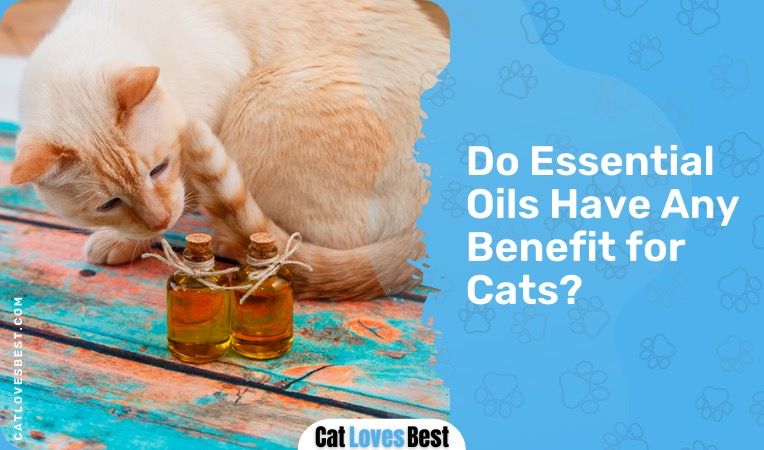
And as far as benefits are concerned, people use these oils for benefits such as regulating sleep, reducing anxiety, as well as alleviating muscle aches and nasal congestion; however, for cats, there aren’t any real benefits from essential oils.
But on the other hand, several companies advertise essential oils as a beneficial and natural solution for cats. Likewise, the claims vary from repelling mosquitos and fleas from the home with oils such as citronella and lavender to helping to calm cats with the smell of chamomile.
However, many pet parents show up to the list of essential oils to avoid using around cats. While natural solutions such as essential oils may help in keeping the occasional fleas away, many vets agree that monthly medicine works as the best preventative treatment for fleas.
Types of Essential Oils
The quality is important when it comes to using essential oils, whether you use them for yourself or for your pet. Likewise, safe oils are unadulterated, genuine, and pure.
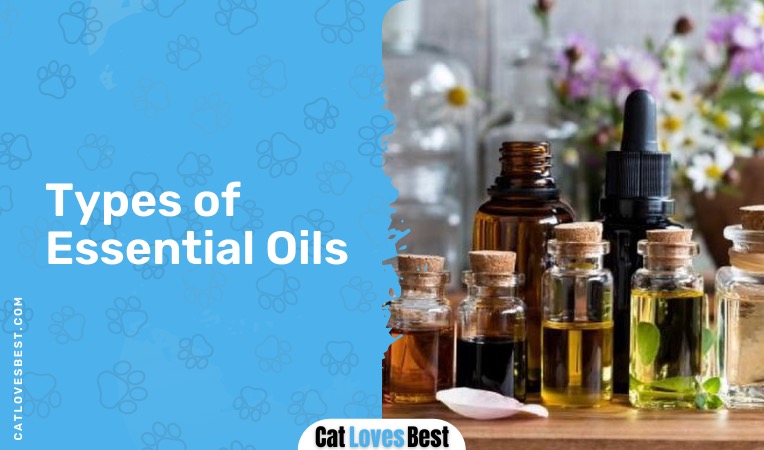
Though some brands market oils as “organic,” “natural,” or even “certified pure” — you still need to be mindful of the oils that you choose, as there is no oversight for essential oils, as they are not regulated by the FDA like the medications are.
And if you intend to apply the essential oils by the way of topical application rather than diffusing, then you will need what is called a carrier oil. It dilutes the essential oils and protects your pet’s skin from potential skin irritation.
Now, let’s look at some of the essential oils that can be toxic and also safe to use around your kitty cat.
Toxic Essential Oils for Cat
As I said before that cats lack a certain enzyme that provides cats with the ability to properly metabolize the different compounds in essential oils, phenols for certain. And these phenolic compounds occur naturally in various plants, and they are highly concentrated in essential oils.
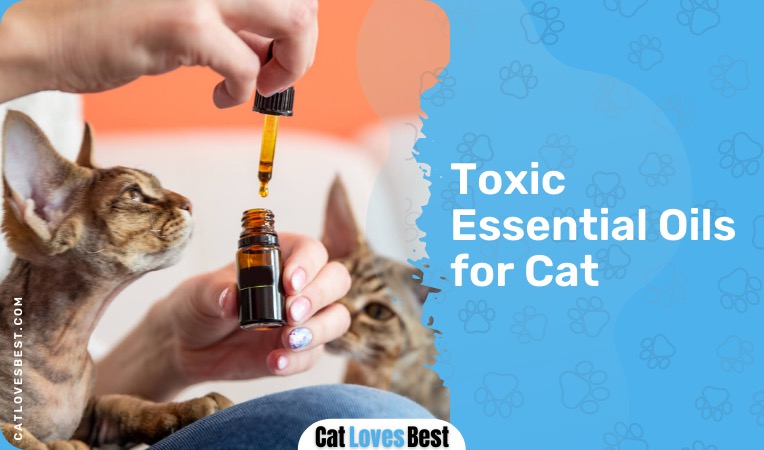
Such compounds usually affect the liver of cats.
These are some of the well-known essential oils that can be toxic to cats:
- Basil oil
- Bitter almond oil
- Citrus oils
- Dill oil
- Fennel oil
- Geranium oil
- Hot oils
- Juniper oil
- Lemongrass oil
- Menthol oils or mint oils
- Myrrh oil
- Nutmeg oil
- Oregano oil
- Pennyroyal oil
- Pine oils
- Rosemary oil
- Sandalwood oil
- Sassafras oil
- Tarragon oil
- Tea tree oil
- Thyme oil
- Wormwood oil
- Ylang ylang oil
- Cinnamon oil
- Clove oil
- Eucalyptus oil
- Peppermint oil
- Sweet birch oil
- Wintergreen oil
The higher the concentration of these oils, the higher the risk it can pose to your cat. In case of accidental ingestion, you should take your cat to the veterinarian right away.
Safe Essential Oils for Cat
Here are a few common essential oils that are safe to use for your cat:
- Lavender
- Copaiba
- Helichrysum
- Frankincense
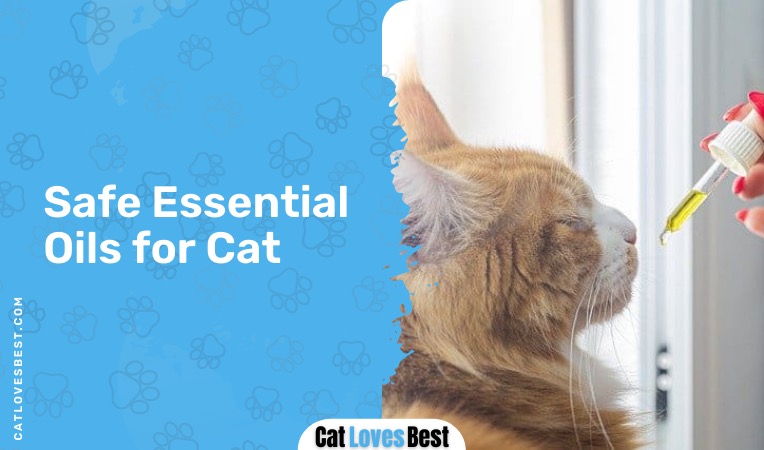
However, in case you diffuse oils in your house, it should not be a cause of worry, as essential oils used in a diffuser are in a highly diluted form — which is different from the direct topical application or dietary supplementation.
Never leave your cat in a confined space where essential oils are being diffused; always make sure that your cat is able to leave the room by herself. Likewise, use the safe essential oils in moderation to maintain a safe environment for your pet.
Are There Any Risks of Using Essential Oils Around Cats?
The main threatening issue with using the essential oils around the cats is respiratory irritation. And this can be very uncomfortable for the cats themselves. It causes a burning sensation in a cat’s nose and throat, which can result in intense coughing, wheezing, and also trouble to breathe properly.
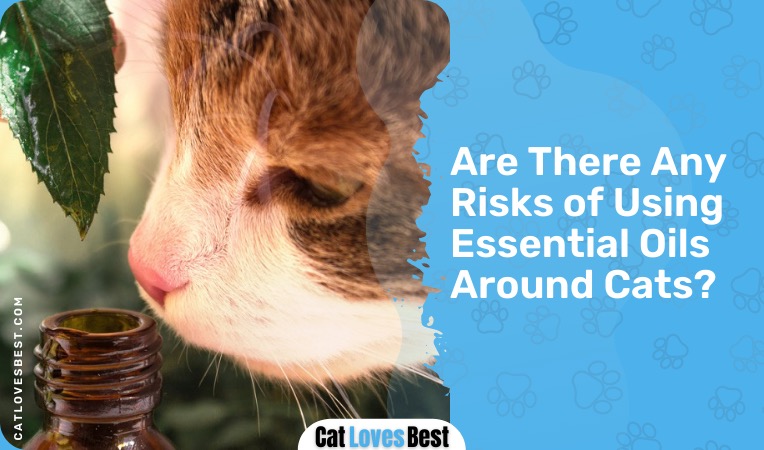
And if your cat experiences any such signs, then you should immediately move the cat to fresh air as soon as possible. If the symptoms don’t seem to be improving, then call and visit your vet right away.
Likewise, if your cat has any underlying health issues, such as asthma or allergies, she may also be at higher risk for essential oils poisoning. Moreover, do not use diffusers or sprays that can make the droplets airborne, as the cats may have trouble breathing.
There is no fixed percentage of concentration of plant essence under which the essential oils are sold by the companies. Some may include only 1 percent, whereas others can include around 20 percent, and others have as high as 100 percent of a plant’s essence. And the risk of harm to your pet around the essential oils increases when the concentrations are higher.
In addition, these oils can be harmful to your cat’s sensitive skin if applied topically, and they can also make her more prone to allergic or toxic reactions. Therefore, it is essential to apply them in diluted form for safety.
What Are the Symptoms of Essential Oils Poisoning
Cats can absorb the essential oils that come directly in contact with their skin. On the other hand, the oils that are diffused in the air are inhaled by cats and can cause respiratory issues. Moreover, the oils can also collect on the fur, and this can result in your cat ingesting them while licking and cleaning.
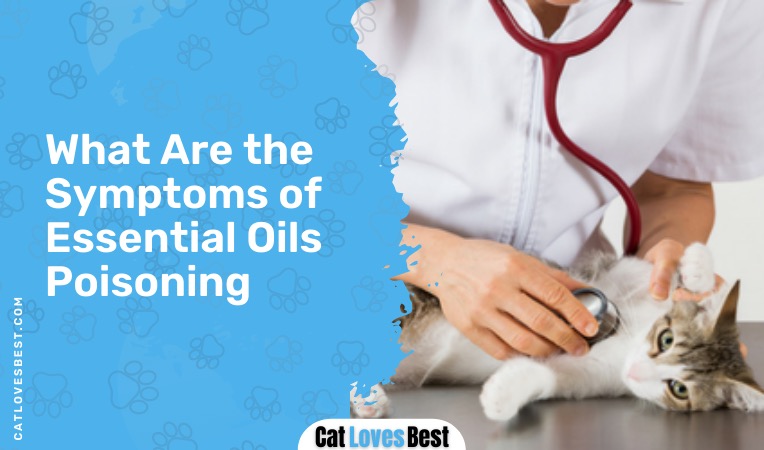
Essential oils toxicity in cats can occur very quickly or over a longer period of exposure. If you think your cat has been exposed to the essential oils, then you should monitor her for symptoms of essential oils poisoning.
Common symptoms of essential oil poisoning in cats can include:
- watery nose and/or eyes
- redness of the lips, gums, and/or skin
- vomiting and/or drooling
- difficulty breathing or panting
- coughing or wheezing
- lethargy, tremors, or wobbliness
- lower heart rate
- drop in the body temperature
In some essential oils poisoning cases handled by ASPCA Animal Poison Control, cats showed symptoms of abnormal walking, muscle weakness, depression, behavioral changes, and even hypothermia.
Moreover, Pneumonia is also likely for cats who breathe in the essential oils that are diffused in the air.
Final Thoughts: When to Call the Vet
So, are essential oils safe for cats? The quick answer is no; essential oils can be highly toxic to household pets, such as cats. Symptoms of essential oil poisoning in cats can include difficulty breathing, coughing, wheezing, drooling, vomiting, tremors, wobbliness, and reduced heart rate.
You should contact your vet or an emergency clinic right away if you think your cat has ingested essential oils, and discontinue the use of any essential oil that causes irritation or discomfort for your kitty. Get veterinary advice right away.
References
- Essential Oils & Cats — Pet Poison Helpline
- How essential oils can affect your pet’s health — Cabbage Town Pet Clinic
- Are essential oils dangerous to cats? — Cats Protection

